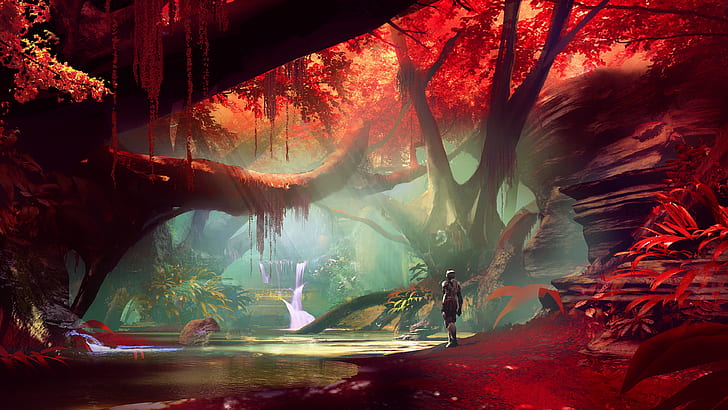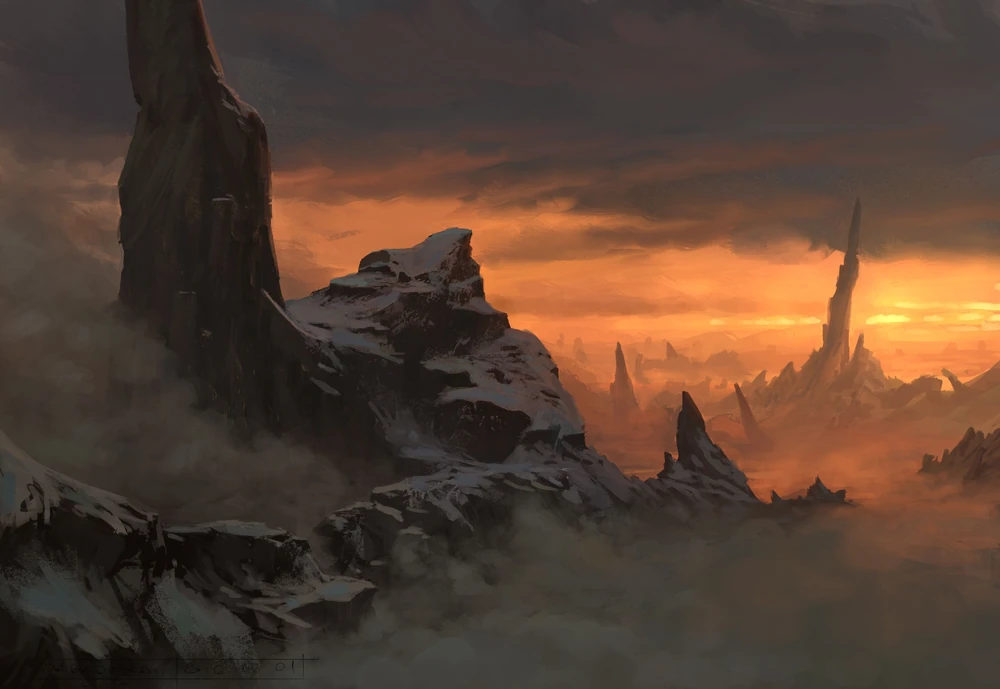Shardspine Mountains
Rising like jagged blades from the crater’s western edge, the Shardspine Mountains are the broken crown of the world, blackened peaks and needle-thin ridges that once glittered with mithril, now steeped in dread. They form a natural barrier against the Dead City of Sol Cindareth, but few would call them safe. Twisted things stir in their valleys, and whispers speak of a dragon that no longer dreams.
History
The Shardspines are rich in mineral veins—silver, iron, gold, and most notably mithril, once mined from a cavern system known as the Heartforge Hollows. This treasure lured builders, kings, and prospectors alike. Whole towns bloomed on the ledges and slopes of the mountain passes, supplying the forges below and trading with the lush lands far to the east and south.
But something changed.
The veins began to hum. Strange lights flickered in the deep. Workers heard voices from the stone and carved altars in secret. The dragon once a protector of the old mine, bound by oath or pact turned. Its scales blackened. Its eyes burned not with fire, but with absence.
Now, it sleeps atop the ruin of Heartforge Hollow, wrapped around what remains of the mithril vaults. No expedition sent to slay it has returned.
The corrupted dragon has no name that endures. Locals call it Ashmirror, for its wings shimmer like burnt glass. It does not soar, it glides, as though gravity has lost meaning in its presence. It no longer breathes fire instead, it exhales Oblivion, and the air around it weeps.
The town that once fed the mine named Tharvorel is now a ruin cloaked in ash and strange symbols, inhabited by Oblivion cultists. These wretches worship the dragon as a mouthpiece of dissolution. Travelers who stumble into their camp are often “welcomed” into sermons that end in fleshwarping.
Oblivion has not only taken the dragon and its faithful. It seeps into the stone, mutating mountain goats into horned aberrations, birds into razor-feathered shrikes, and once-docile cave beasts into limb-twisted horrors.
Even without corruption, the mountains were brutal. Narrow passes collapse without warning. Thin ledges fall into canyons. Snow falls out of season, freezing the unprepared.
But the worst are the sounds. Echoes that answer in voices not your own. Screams that come from nowhere. Dreams that linger after you wake.
Hidden Paths
While most steer clear of the Shardspines, a legendary few make a living guiding others through it. These are the Hollow Teeth. A scattered, secretive brotherhood of guides, smugglers, and ex-Wayfarers. Cloaked in wind-worn leathers and bound by old pacts, they know the secret trails that thread through the teeth of stone.
They do not advertise. You find them only when you are desperate, and only if they think you are worth the risk.
Some say a few are not quite human anymore that the mountains have taken something from them and replaced it with silence
The mountains are also sacred to the Wayfarers, the ancient rangers who follow the teachings of the Wanderer. Though many tunnels have collapsed or been sealed to slow the spread of darkness, a few remain.
Elite Wayfarers sometimes undergo their promotion trials in the Shardspines; missions to retrieve sacred relics, map forgotten paths, or eliminate monstrous threats no one else will face. These trials are rarely spoken of and often fatal, but those who return are marked forever by the mountains’ gaze.
Some say the Wanderer himself once passed through the Shardspines barefoot, and that his footprints still mark hidden glades where even monsters dare not tread.
Merchants almost universally avoid the Shardspines. The eastern passes are longer, but safer with paid guards and proper escort. Only desperate smugglers, spies, and outcasts brave the mountain trails.
A few try their luck, hoping to avoid taxes or bounty hunters, only to vanish or worse, be found days later at the edge of the valley, eyes wide and speaking in tongues.
Those who attempt to mine new veins in the range are usually warned:
“Mithril shines brighter than gold but casts a deeper shadow.”




Comments